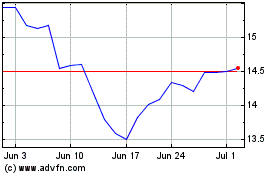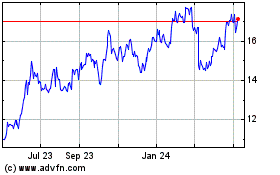In Gambit, Brazil's Embattled President Names da Silva to Cabinet
March 16 2016 - 5:20PM
Dow Jones News
BRASÍ LIA—Former Brazilian President Luiz Iná cio Lula da Silva
accepted a position in President Dilma Rousseff's cabinet on
Wednesday, in a move that could shield him from pending criminal
corruption charges and help Ms. Rousseff in her own fight to stave
off impeachment proceedings.
Mr. da Silva, who remains the nation's most controversial and
charismatic political figure despite leaving office six years ago,
will be the new chief of staff, succeeding Jaques Wagner.
Ms. Rousseff's appointment of her political mentor certifies Mr.
da Silva's stunning return to the center of Brazilian politics,
even as he faces allegations of money laundering and other misdeeds
in connection with the massive scandal centered on state oil
company giant Petró leo Brasileiro SA.
Although his approval ratings have fallen dramatically in recent
months, Mr. da Silva remains popular enough to again consider
running for president in 2018.
Mr. da Silva's official title as chief of staff suggests he'll
be an all-purpose adviser to the president, but analysts believe
he's effectively replacing Ms. Rousseff in all but name.
"The choice means the transfer of real power…to former President
Luiz Iná cio Lula da Silva and the voluntary abandonment of power
by Dilma Rousseff," said Paulo Sotero, director of the Brazil
Institute of the Woodrow Wilson International Center for
Scholars.
The widely anticipated move was interpreted by several analysts
as a bid by Ms. Rousseff and her ruling Workers' Party, known as
the PT, to shore up her support within Brazil's lower house of
Congress and fend off impeachment proceedings that were launched
against her in December. Ms. Rousseff has been accused of using
loans from state banks to plug a massive budget hole, but she
denies the allegations.
Despite his growing legal woes, Mr. da Silva remains a towering
figure in Brazilian politics. Some believe his political charisma
and deep knowledge of how to pull the levers of Brasí lia's
political machinery, by trading ministerial posts and other perks,
could persuade enough lawmakers to stand by Ms. Rousseff.
"He has great power to bring people together," said PT Sen.
Paulo Paim, one of the founders of the party who said he supports
Mr. da Silva's return.
Others say Mr. da Silva's return to government was aimed chiefly
at keeping him out of jail. He's under investigation in a massive
corruption probe and was recently charged with money laundering,
which he denies. Under Brazilian law, government ministers can only
be tried by the Supreme Court, raising the bar for federal
prosecutors.
"The short-term goal…is to give him a privileged forum" to avoid
prosecution in a lower court, said Mr. Sotero of the Woodrow Wilson
center.
Financial markets have reacted badly to the possibility that Mr.
da Silva could delay or derail the impeachment of Ms. Rousseff,
whose interventionist policies many blame for Brazil's current
economic woes and for the loss of its hard-won investment-grade
credit rating.
Win Thin, global head of emerging markets strategy for Brown
Brothers Harriman in New York, said Mr. da Silva's return to power
is "a game-changer" that could herald the government's "veering to
the left" on economic policy.
"It's very, very negative for Brazil," Mr. Thin said. "I don't
think Lula coming back was on anyone's radar outside Brazil until a
few days ago…Quite frankly, I'm shocked."
The Ibovespa stocks index was down 1% at 1:28 p.m. local time,
while the real was trading at 3.7904 to the dollar, weaker than
Tuesday's close of 3.7592.
Other analysts were less certain that Mr. da Silva's appointment
signals a leftward tilt to Brazil's economic policy. Similar market
fears greeted Mr. da Silva's election as president, and some
analysts predicted Brazil would be ruined as massive government
spending fueled runaway inflation.
Indeed, during his two terms in office from 2003 to 2010, Mr. da
Silva pushed social spending programs that raised millions of
Brazilians out of poverty. But he generally allowed his finance
minister and senior economic advisers to shape financial
policy.
That pattern may well continue with Mr. da Silva's return to
power.
"I do not see major changes economically," said Carlos Kawall,
chief economist at Banco J. Safra in Sã o Paulo who served as head
of the Brazilian Treasury in 2006 under Mr. da Silva's
administration. "Lula never intervened in the Treasury in my time
working there."
Mr. Kawall said that any shift toward a populist economic policy
would endanger Mr. da Silva's main political objective of enlisting
support to prevent Ms. Rousseff's impeachment. However, Mr. Kawall
said, it is likely that Mr. da Silva will hew to Workers' Party
orthodoxy and try to block Ms. Rousseff's attempt to push pension
reforms that many analysts believe are needed to help jump-start
Brazil's economy.
Mr. da Silva's appointment is sure to galvanize the trade
unionists who form the base of the leftist Workers' Party, which he
co-founded in 1980. It is also likely to infuriate the millions of
Brazilians who turned out in nationwide street protests last Sunday
to demand Ms. Rousseff's ouster from office and to denounce Mr. da
Silva.
Luciana Magalhaes and Rogerio Jelmayer contributed to this
article.
Write to Paulo Trevisani at paulo.trevisani@wsj.com
(END) Dow Jones Newswires
March 16, 2016 17:05 ET (21:05 GMT)
Copyright (c) 2016 Dow Jones & Company, Inc.
Petroleo Brasileiro ADR (NYSE:PBR)
Historical Stock Chart
From Mar 2024 to Apr 2024

Petroleo Brasileiro ADR (NYSE:PBR)
Historical Stock Chart
From Apr 2023 to Apr 2024
